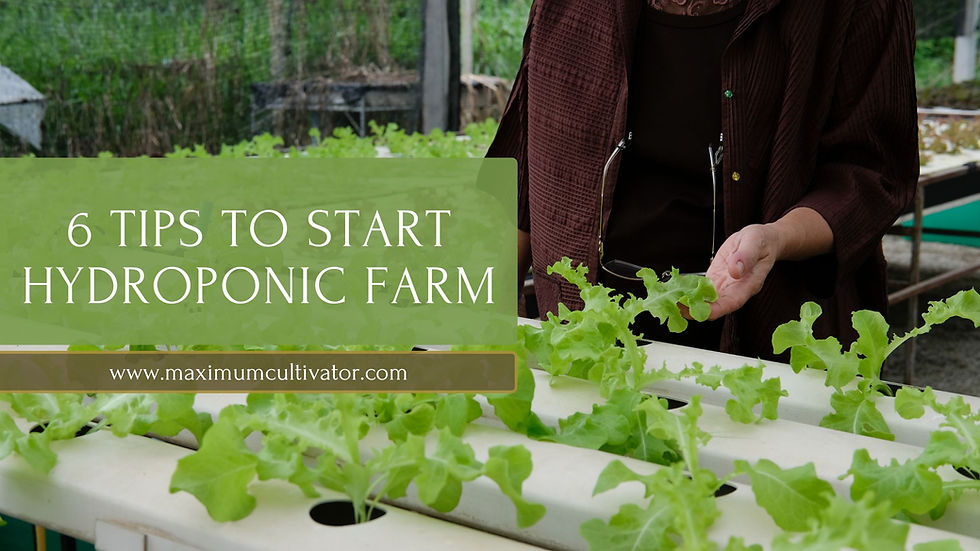What's a Hydroponic Farm Manager? And How to Become One
- Maximum cultivator
- Sep 29, 2022
- 4 min read
Updated: Sep 30, 2022
Learn more about hydroponic farm manager and the skills you need to become one.
A Hydroponic Farm Manager is responsible for setting up the total farm in the right way, from growing crops to managing employees. To be successful in that role,

hydroponic farm managers need to have great skills in growing hydroponic crops and technology. From seed to harvest plants are taken care of by the farm manager who also needs to take care of any pests or diseases or nutrient deficiencies.
Hydroponic farm manager has become a key role in the agriculture industry, even greenhouse owners are hiring hydroponic farm managers to improve their crops in a great way. Skill in hydroponic farming adds a lot of value to your career, lot of farms are turning towards hydroponic farming, and there are a lot of indoor farms, micro green farms, and greenhouse growing crops that hydroponic farm managers can work on.
What does a hydroponic farm manager do?
Hydroponic farm managers are ordinarily responsible for developing strategies to increase production, Mixing nutrients, Checking plant EC & pH, managing seeding, planning, and scheduling seeding, and also harvesting and communicating with farm owners about everything.
As a hydroponic farm manager, your specific responsibilities will depend on the size of your company or farm. If you work on large farms you typically plan and schedule crops and monitor on daily basis. If you work on small farm you need to take care of seeding, transplant and other duties too.
If you’re interested in working as a hydroponic farm manager, your tasks may include:
Increasing production and timely harvests: Boost a farm's production on all active crops by increasing the number of harvests they have and the number of crops(Kgs, varieties, crop size) they receive. You may be expected to try new things and make it possible
Strategizing and scheduling crops: To drive high harvests, you’ll be responsible for ideating (and sometimes executing) seeding plans that align with a company’s larger marketing strategies. You may also generate ideas for timely and evergreen plans that clients love.
Analyzing data: In addition to creative work, you’ll also spend time analyzing data of crops to draw conclusions about how a crop is performing is it going to meet the end harvest or not.
Reporting metrics to key farm owners: Farm owners want to know the work you’re doing has an impact, so you’ll likely be expected to report your achievements—or any problems that arise—to your team and even the company's stakeholders. They’ll probably be looking to see how you grow crops, increase production, and develop creative new techniques and harvest, among other metrics.
Planning and monitoring farm: Depending on the size of your team, you may be responsible for Seeding and Harvesting all other works. In that case, you may need to plan everything and observe the farm’s responses.
Hydroponic Farm Manager Skills
If you’re interested in becoming a social media manager, it’s a good idea to improve your skills in the following areas:
Monitoring Plants: B Every day your need to monitor the plants on the farm and need to write a report on a daily basis. Whenever you found something is working well or bad you need to note it down and improve it.
Record Keeping: Alongside monitoring plants, you’ll likely need to review your team members’ work and ensure it's correct and error-free. Honing your monitoring and record-keeping skills can help you develop the eye necessary to reassure a farm or brand that they’re in safe hands.
An understanding of hydroponic plants: You’ll need to have a thorough understanding of several hydroponic crops, their strengths, weaknesses, and technical growth, problems, among other characteristics—to manage plants successfully. Knowledge of the following is very important EC, pH, Farm maintenance, and Nutrient deficiency.
An eye for stock: Be prepared to communicate about raw materials, nutrients, seeds, and more with other growers, marketing managers, and other marketing people.
Analytical tools: You need to analyze crop production so that it won't go down or waste the crop by growing high. Also no need to grow crops that won't sell in the market. So, always analyze your crop data with you.
Flexibility: Change is constant in the world of hydroponics. New trending techniques, crops, and features often require hydroponic farm managers to think on their feet and incorporate novelty into their work.
Hydroponic farm manager: Job outlook and salary
The average salary for a farm manager is $48,464 per year in the United States.
Farm Manager salary in India with less than 2 years of experience to 20 years ranges from ₹ 1.9 Lakhs to ₹ 18 Lakhs with an average annual salary of ₹ 5.5 Lakhs based on 197 salaries.
Hydroponic farming is growing rapidly in the whole world, if you have got skills you can work anywhere in the world.
Getting started
Hydroponic farm managers can act as the organization’s vision to grow great crops in a great way and promote their vision. If you’re ready to start learning, consider the Modern Hydroponic Certificate Course - from Maximum Cultivator





Comments